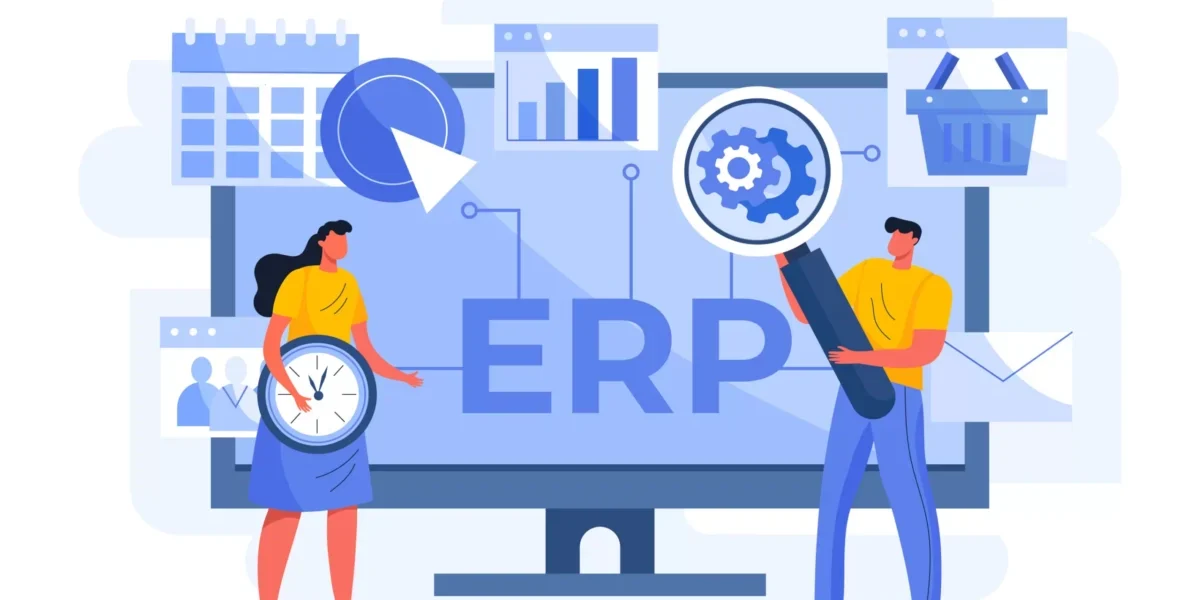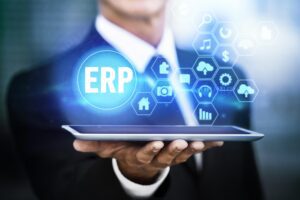Breaking Down ERP System in Accounting
ERP systems serve as essential tools that businesses use to keep operations running smoothly. Enterprise Resource Planning (ERP) systems function as all-in-one software platforms, much like a Swiss Army knife for business management, integrating everything from planning and purchasing to inventory, sales, marketing, finance, and HR. These systems act as the ultimate organizational tool, helping companies streamline their operations and improve efficiency.
By bringing all these processes together into a unified platform, ERP System in Accounting allow businesses to gain a comprehensive view of their operations. They automate tasks and provide valuable insights drawn from a central database, collecting inputs from every department, including accounting, manufacturing, supply chain, sales, marketing, and human resources.
Related Topic: The Differences Between MES and ERP Systems for the Food Industry Explained
ERP System in Accounting
The role of ERP systems in accounting has gained substantial traction over the past few years. ERP stands for Enterprise Resource Planning, a system that integrates various functions of a business into one comprehensive solution. In the context of accounting, ERP systems consolidate financial data across different departments, ensuring seamless data flow and accurate reporting.
An ERP system in accounting not only simplifies traditional accounting tasks but also enhances the ability to forecast, plan, and manage finances in real-time. As the core of business management, it supports everything from budgeting and financial statements to tax preparation and auditing, making it a valuable asset for any company.
Related Topic: Top 5 ERP Modules to Put on Your Radar In 2024
What Does an ERP System in Accounting Do?
ERP systems in accounting are the backbone of modern businesses, handling every data-driven task you can think of. Imagine you’re running a bakery; an ERP system is like having a magic cookbook that not only stores your favorite recipes but also tracks your ingredients, manages your finances, keeps tabs on your employees, and even handles customer orders—all in one place. Here’s a snapshot of what these systems can do:
- Money Matters: ERP systems centralize financial data, cutting out tedious manual data entry, and ensuring the numbers add up. This module covers everything from managing payables and receivables to overseeing the general ledger and fixed assets.
- People Management: Handles everything HR—from employee records and payroll to recruitment and benefits. It’s like having a super-efficient assistant who never forgets a detail, making sure all HR processes are smooth and compliant with the law.
- Keeping the Supply Chain Rolling: From the raw materials to the finished product on the shelf, supply chain management in an ERP system ensures everything flows smoothly. It tracks goods, data, and finances to keep production humming along.
- Customer Connections: Customer is king, right? A CRM module in an ERP system manages interactions with both current and potential customers, strengthening relationships and boosting satisfaction and sales.
- Making Things: ERP systems streamline production processes—from planning and scheduling to quality control—ensuring everything runs like clockwork on the manufacturing floor.
- Inventory Control: Keeping track of inventory across multiple locations and optimizing stock levels so you never run out or overstock. Think of it as your personal inventory manager, always on the ball.
- Project Power: Planning, executing, and wrapping up projects becomes a breeze. With an ERP system, you can manage resources, stick to budgets, and hit your deadlines without breaking a sweat.
- Online Sales: Connecting the dots between online sales channels and back-office systems. This makes for a seamless shopping experience for customers—whether they’re buying a single cupcake or a hundred dozen.
ERP systems also come with other handy modules, making them even more indispensable for improving efficiency and productivity. By integrating various functions, ERP systems offer a full-spectrum solution for managing a business’s resources and operations effectively.
In short, ERP systems are like the trusty sidekick in your favorite superhero movie—always there to back you up and keep things running without a hitch.
Related Topic: Manufacturing ERP Software For Bakeries: A Formula For Success
Why ERP System in Accounting is a Game-Changer?
Switching over to an ERP system can revolutionize how businesses, especially those in food & beverage, life sciences, specialty chemicals, and consumer products, manage their finances. Here’s a closer look at why it’s such a big deal, focusing on boosting efficiency, upping productivity, and nailing down data accuracy.
Get More Done, Faster
ERP systems are all about streamlining. By connecting and automating various business operations, they cut out the repetitive, time-wasting stuff. Citing Investopedia, companies using ERPs can crank out results quicker and with fewer mistakes.
Here’s what that looks like in day-to-day business:
- No More Manual Revenue Tracking: ERPs automate revenue recognition, drastically slashing the room for those pesky manual-entry errors.
- Maxed-Out Resources: Better resource allocation means higher project profits.
- Smoother Operations: Automated systems take the busywork off your plate, leading to slicker workflows and operational boost.
- Teamwork Makes the Dream Work: Centralized data access enhances collaboration across different departments.
Different Types of ERP System
Enterprise Resource Planning (ERP) systems come in different flavors, each catering to unique business demands. Let’s break down the main types—On-Premise vs. Cloud ERP—and dive into industry-specific ERP solutions that can really give businesses, especially those in process industries, an edge.
On-Premise vs. Cloud ERP
| Feature | On-Premise ERP | Cloud ERP |
| Deployment | Local installation on company servers | Hosted on remote servers; accessed via the internet |
| Cost Structure | One-time license fee + maintenance | Subscription-based pricing model |
| Scalability | Needs more internal resources | Easily scalable without much hassle |
| Maintenance | Handled by company IT team | Managed by the ERP provider |
| Accessibility | Limited to local network | Global access with an internet connection |
Got a knack for control? On-Premise ERP systems are your jam. They sit right on your company’s local servers, offering top control over everything—but at a cost. We’re talking hefty investments in hardware, plus a dedicated IT team to keep things running smoothly.
If you’re aiming for efficiency and not looking to break the bank, Cloud ERP systems are it. Think of them as the Netflix of ERP—hosted on remote servers, accessed online. These are perfect for growing businesses thanks to their lower costs, easy scalability, and the fact that the ERP provider handles updates and maintenance.
Industry-Specific ERP Solutions
Then there’s the specialized stuff—ERP systems tailor-made for specific industries. These aren’t your one-size-fits-all solutions; they come with customized features addressing the unique demands of each sector.
| Industry | Key Features | ERP Systems |
| Food & Beverage | Food safety compliance, traceability, inventory | Microsoft Dynamics 365, Aptean Food & Beverage ERP |
| Life Sciences | FDA compliance, lab management, clinical trials | SAP Life Sciences, Oracle E-Business Suite |
| Specialty Chemicals | Hazardous materials management, batch process manufacturing | Deacom, Infor CloudSuite Chemicals |
| Consumer Products | Supply chain management, demand forecasting | SYSPRO, NetSuite |
Take the food and beverage industry, for instance. It’s all about keeping up with food safety regulations and maintaining inventory. Or, think about life sciences, where everything has to align with FDA regulations; plus, there’s the whole lab management and clinical trials thing.
These industry-focused ERPs allow businesses to tailor their systems precisely to their needs. They offer specialized modules that help companies make smarter, data-driven decisions, get insightful analytics, and adapt quickly to market changes.
Whether you’re leaning towards an On-Premise or a Cloud ERP, or diving into industry-specific solutions, the right choice can supercharge your business processes. For instance, specialized modules for accounting, finance, HR, supply chain management, and manufacturing ensure you get comprehensive support across all functions (Cube Software).
Picking the right ERP system can seriously level up the efficiency and effectiveness of your business operations. So, what are you waiting for? Time to get organized!
How to Choose the Right ERP System for Accounting?
Selecting the right ERP system for your accounting needs can be a daunting task. Here are a few factors to consider:
Business Size and Needs
The size of your business and the complexity of your accounting processes will influence which ERP system is best suited to your needs. Larger enterprises may require highly customizable solutions, while smaller businesses may benefit from more standardized, out-of-the-box software.
Budget
ERP systems vary widely in price. Cloud-based ERP systems can offer more affordable pricing structures, while traditional on-premise systems usually come with higher upfront costs but more customization options. Assessing your budget against the long-term value is crucial for making the right choice.
Integration Capabilities
ERP systems should integrate smoothly with other software tools your company uses. This includes CRM systems, HR software, and other business management tools. Seamless integration ensures data consistency across the organization, reducing manual inputs and improving overall efficiency.
Customization Options
Every business is unique, and your ERP system should reflect that. Some ERP systems offer extensive customization options, while others are more rigid in their framework. Consider how much flexibility you need in adjusting the software to your specific accounting processes.
Final Thoughts: Master Financial Efficiency with ERP System in Accounting
An ERP system in accounting is a transformative tool for businesses of all sizes. By optimizing financial processes, enhancing accuracy, and improving reporting capabilities, ERP systems enable businesses to manage their finances with greater efficiency.
Although the initial setup can present challenges, the long-term advantages such as streamlined operations and scalable growth far outweigh the upfront costs.
For businesses looking to maximize efficiency and drive future growth, investing in an ERP system is a smart move. Learn more about how ERP solutions can benefit your business at EZSoft Inc..
FAQs
What is an ERP system in accounting?
An ERP system in accounting is a software solution that integrates various financial processes, such as general ledger, accounts payable, and financial reporting, into a single system to streamline operations.
How does an ERP System in Accounting improve financial reporting?
ERP systems improve financial reporting by automating data collection, ensuring real-time accuracy, and providing tools to generate detailed reports with ease.
Are ERP systems expensive for small businesses?
While traditional ERP systems can be costly, cloud-based solutions offer more affordable options for small businesses with a pay-as-you-go model.
Can ERP System in Accounting be customized for specific business needs?
Yes, many ERP systems allow customization to meet the unique financial processes and requirements of different businesses.
What are the challenges of implementing an ERP system in accounting?
Challenges include high initial costs, the complexity of integration, and employee resistance to change due to the system’s learning curve.
How do ERP System in Accounting support regulatory compliance?
ERP systems ensure compliance by automatically updating with the latest regulations and maintaining audit trails for financial reporting.








